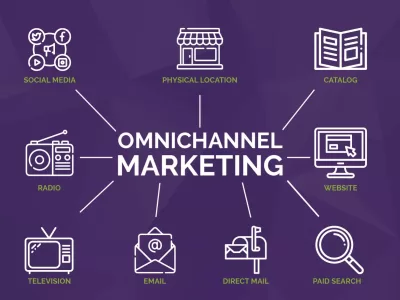Table of Contents
When creating an effective marketing strategy for your enterprise, take all the customer touchpoints into consideration. Pay attention to how your target audience moves between various engagement channels and what information they seek while interacting with your online store or the ones offering similar products or services.
Putting all of this in an omnichannel marketing strategy ensures that you provide your customers with a consistent customer experience. This can work for both retail and eCommerce businesses.
Omnichannel marketing is the integration and cooperation of multiple channels organizations use to interact with their customers or target audience with the sole motive of creating a consistent brand experience. It includes both physical as well as digital channels.
The ultimate goal of an omnichannel marketing strategy is to build a convenient and straightforward user experience for consumers. Multiple industries, such as retail, healthcare, finance, information technology, artificial intelligence, etc., have adopted omnichannel marketing strategies.
It can be a tedious task to develop and design a marketing strategy that fetches maximum results, especially when a business considers individual customers and each touchpoint. In this article, we will learn about omnichannel marketing and how you can improve it.
Let’s begin.
What is Omnichannel Marketing?

Omnichannel marketing is the straightforward integration of branding, messaging, and offline and online touchpoints as customers move down the sales funnel, enabling an impactful customer experience. It’s been impactful to businesses allowing them to reach more customers.
It follows a customer-centric view as the marketing tactic. An omnichannel strategy ensures customers have a positive and consistent user experience on each channel.
The Benefits of Omnichannel Marketing
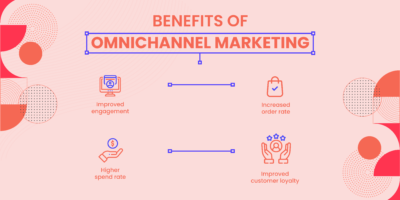
Omnichannel marketing strategies can help you in multiple ways.
- Enhance customer lifetime value
- Reach new customer segments
- Enhanced operational efficiency
- Increased sales
- Improver inventory turnover
Tips to Improve Your Omnichannel Marketing Strategies
Here are a few tips that will help you improve your omnichannel marketing strategies.
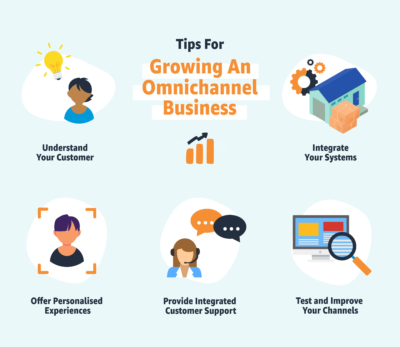
1- Pick up The Channels That Your Audience is Interested In
In addition to categorizing your target audience based on basic demographics like age, gender, and geographical location, you can also identify the channels they are interested in or use to engage with or interact with your brand. Omnichannel strategies should not necessarily include all the touchpoints. Instead, focusing on the channel your target audience uses most to interact will help you reach significant limits and generate more leads.
Once you have identified the channels your potential customers use to interact with your brand, understanding the type of device they use and the content they usually find engaging is beneficial. It is all about finding answers to questions. For instance, does your target audience like to watch videos on YouTube while others on Facebook, whether they use a laptop or a mobile phone, and is your content designed per their screen sizes? The gist of your target audience will help you frame competitive omnichannel marketing strategies.
2- Keep The Brand Communication Consistent Across the Platform
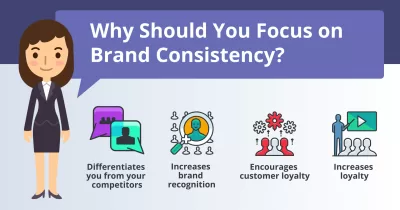
Creating consistent branding solutions for all platforms helps you understand that your customers are not confused and immediately recall your brand when they encounter a particular template, way, or tone in content delivery. While designing your omnichannel strategies, you must focus primarily on balancing creating channel-specific content and being consistent with that.
One of the ideal ways to do this is to leverage the pre-made content and communicate it through various platforms; for instance, you can use an infographic from a webinar to be posted on social media post, create a detailed blog around it, or quote the gist of it on Twitter. This helps to not only build consistency but also offer better returns from each piece of content that you have curated.
3- Leverage Marketing Automation & Marketing Channels

Instead of being stuck in the past, try leveraging the power of new and better marketing channels and automation to improve your overall customer experience. New multichannel strategies will help you streamline processes, save money, and enhance general sales. By embracing multichannel marketing, businesses can leverage the evolving landscape of technology to deliver immersive and personalized experiences that resonate with consumers. This increases customer satisfaction and drives brand loyalty and revenue growth.
Marketing automation will help you reach your customers at the right time, improving revenues. As businesses evolve in a digitally driven world, integrating multichannel strategies paves the way for a more seamless transition towards a comprehensive omnichannel marketing approach, ultimately driving success in today’s competitive marketplace.
Omnichannel marketing examples show that the returns might increase by leveraging the power of the constantly evolving state of technology like virtual reality and Artificial Intelligence, allowing the customers to try the product in real-time before they buy it. It can also be used for furniture, cosmetics, or apparel, and customers can see how the effects will look on them.
Although omnichannel marketing is the ultimate goal for many businesses, incorporating multichannel strategies can serve as a valuable tip towards achieving this holistic approach. Multichannel marketing allows companies to establish a presence across different platforms, catering to diverse customer preferences and behaviors.
4- Leverage Data to Gain a Competitive Business Environment

An omnichannel marketing strategy offers insightful data, allowing you to better understand your customers and their buying behavior. The data collected from various digital and physical channels need to be analyzed to see where your consumers are coming from, how they choose to engage with your brand, and what efforts you need to compel them to buy from you.
For instance, while a substantial Instagram following may indicate a strong social media presence, an omnichannel strategy delves deeper into the data to discern which types of content drive actual purchasing decisions. Through detailed analysis, businesses can identify the most effective marketing tactics to compel consumers to make purchasing decisions.
Integrating a data-driven approach in an omnichannel marketing strategy ensures that data-driven insights inform strategic decision-making, guiding efforts to optimize customer experiences and drive sales. By leveraging data from diverse channels, businesses can tailor their marketing initiatives more precisely, delivering targeted content that resonates with their audience’s preferences and behaviors.
Leveraging data also helps businesses stay ahead of the competition by continuously refining their approach to meet evolving consumer demands and expectations.
5- Listen & Respond Through Multiple Marketing Channels
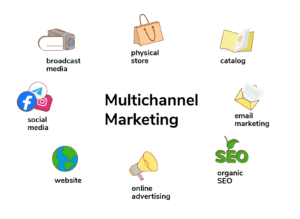
Creating an omnichannel marketing approach allows you to build consistent engagement with your customers in a wide variety of places. It includes online, in-store, and through multiple different channels like various social media platforms. It allows you to add a touch of personalization in your messaging tailor-made to each customer.
While social media platforms act as a beautiful and impactful way to engage with your customers, a lack of delayed responses is one of the primary drawbacks. Being consistent in replying to your customers or potential customers brings automation into the picture, ensuring maximum satisfaction and the value of being important amongst the customers.
6- Don’t Overlook The Offline Opportunities
No matter how hard it is for you to accept, your customer is divided into online and offline markets. In order to use the offline opportunities, you don’t actually have to own a physical store. You can leverage the power of traditional marketing channels, including radio, magazine ads, branded merchandise, direct cold emails, or event sponsorships.
One of the most effective approaches is ensuring that your branding and customer journey tracking are consistent for every touchpoint, as it indicates that your customers will have easy access to the products they would have if they were buying online.
7- Personalization Is The Key

One of the key ways to improve your omnichannel marketing strategies and efficiency is the ability to build personalized interactions, resulting in an unforgettable customer experience. The overall conversions and ultimate sales can increase using technologically advanced software that allows you to send customized SMS, emails, and push notifications.
As easy as it may sound, ensuring you have the right content ready before sending it out through SMS or emails is essential. Also, ensure that you are using the channels that provide value to your customers, allowing you to generate a great return on investments.
8- Analyze & Re-target Your Customer

If you want a customer to convert, you need to show your product more than once. Omnichannel marketing strategies help you track your customers to remind them at regular intervals about your products. This is where retargeting comes into the picture and enables you to improve your sales.
Using data from across the channels helps you track people through their entire customer journey. Integrated analytical platforms collect data from all the channels and analyze it to fetch the details about which strategies are working in your favour and which are not.
Read on: tips on creating product descriptions that lead to conversions
Conclusion
Creating an effective and competitive omnichannel strategy allows you to enhance customer experience, increase revenue, and help you understand your customers better. The tips mentioned above will contribute to improving your omnichannel marketing strategy efforts.



